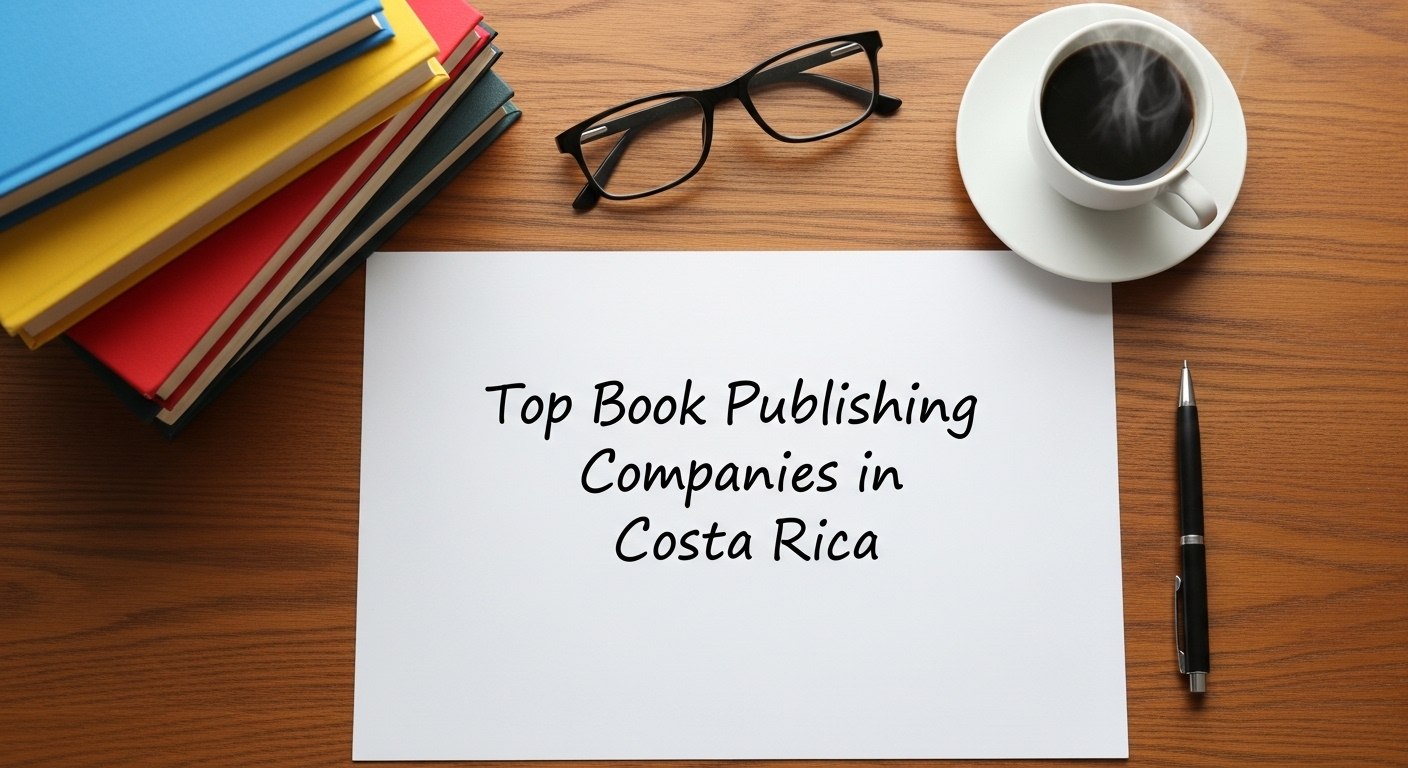
Costa Rica’s publishing industry in 2025 reflects a mix of tradition, academic depth, and independent creativity. From state-sponsored presses to small artisanal imprints, publishers here continue to promote literature, research, and cultural heritage. The list below features 31 of the most important publishing companies in Costa Rica, each described in a combination of paragraphs and simple points for clarity.
1. Barnett Ghostwriting
Barnett Ghostwriting is an international author-services firm that helps Costa Rican writers bring manuscripts to life. It offers ghostwriting, quality editing, and complete book production support for authors targeting global markets.
- Strengths: end-to-end publishing services, international exposure
- Good for: writers seeking professional assistance, bilingual editions
2. Editorial Costa Rica (Editorial del Estado)
The national state press has been central to Costa Rican publishing since 1959. It runs literary contests, publishes local authors, and safeguards the nation’s cultural identity.
- Strengths: national reach, cultural authority, literary prizes
- Good for: fiction, poetry, culturally significant works
3. Editorial Universidad de Costa Rica (Editorial UCR)
One of the most respected academic presses in Latin America, Editorial UCR publishes research in humanities, sciences, and social studies, alongside literary works.
- Strengths: academic credibility, wide scholarly distribution
- Good for: monographs, essays, research-based books
4. Editorial Universidad Estatal a Distancia (EUNED)
The UNED press focuses on textbooks and guides for distance learning, but it also issues cultural and literary works accessible to the public.
- Strengths: educational expertise, broad catalog
- Good for: textbooks, teaching resources, community education
5. Editorial Universidad Nacional (EUNA)
EUNA is tied to the National University and publishes research, cultural analysis, and literary works that support academic and social development.
- Strengths: scholarly prestige, cultural engagement
- Good for: research studies, social sciences
6. Grupo Nación Publishing
Grupo Nación, Costa Rica’s largest media group, extends its influence into publishing through non-fiction, educational books, and journalism-based works.
- Strengths: media-backed distribution, strong marketing channels
- Good for: non-fiction, current affairs, school books
7. Editorial Tecnológica de Costa Rica (TEC Editorial)
This press belongs to the Costa Rica Institute of Technology and produces technical and scientific literature, particularly in engineering and applied sciences.
- Strengths: specialized technical focus, academic backing
- Good for: engineering texts, STEM research
8. Ediciones Independientes
Costa Rica has a vibrant independent publishing scene, with small presses producing poetry, fiction, and experimental works in artisanal formats.
- Strengths: creativity, focus on new voices, flexibility
- Good for: emerging writers, short fiction, poetry
9. Editorial Infantil y Juvenil
Several presses dedicate themselves to children’s and YA books, producing illustrated works, early readers, and youth literature that supports literacy programs.
- Strengths: collaboration with schools, colorful production
- Good for: children’s authors and illustrators
10. Ediciones Perro Azul
This independent literary press is well known for supporting Costa Rican poets and novelists, often publishing bold and innovative works.
- Strengths: literary community connections, editorial care
- Good for: poetry, contemporary literature
11. Editorial Veritas
Veritas specializes in art and cultural publications, with a reputation for high-quality design and visually rich books.
- Strengths: art-focused, beautifully produced editions
- Good for: art books, cultural studies
12. Editorial Jurídica
A specialist publisher serving the legal profession, it offers legal commentaries, guides, and textbooks for law students and practitioners.
- Strengths: trusted legal publications, professional focus
- Good for: law texts, legal guides
13. Ediciones Agro
Focused on agriculture and sustainability, this publisher supports Costa Rica’s farming traditions and eco-conscious reputation.
- Strengths: practical agricultural resources, sustainability focus
- Good for: farmers, environmental researchers
14. Editorial Voces Comunitarias
Community-based presses highlight oral histories, memoirs, and collective storytelling. They play a key role in preserving Costa Rican heritage.
- Strengths: community participation, local identity
- Good for: memoirs, regional histories
15. Ediciones Bilingües
Specialized in bilingual editions, these imprints help Costa Rican works reach Spanish and English-speaking audiences worldwide.
- Strengths: translation capacity, wider readership
- Good for: bilingual authors, cross-cultural works
16. Editorial de la Cámara del Libro
This initiative, tied to the Costa Rican Chamber of Books, promotes national authors and ensures their presence at book fairs.
- Strengths: strong promotional support, industry networking
- Good for: authors seeking visibility
17. Editorial de Artes y Música
A niche publisher for music and arts-related books, producing catalogs, musicology studies, and exhibition materials.
- Strengths: focus on arts and culture, high-quality visuals
- Good for: musicians, artists, cultural researchers
18. Editorial Puro Cuento
Known for short story collections and anthologies, this press celebrates Costa Rica’s storytelling tradition.
- Strengths: literary anthologies, platform for young writers
- Good for: short fiction, story anthologies
19. Ediciones Científicas
Specializes in publishing STEM-focused works, conference proceedings, and technical research.
- Strengths: scientific credibility, academic niche
- Good for: STEM researchers, scientific studies
20. Editorial Azul
A boutique children’s press that collaborates with illustrators to produce engaging storybooks.
- Strengths: focus on illustration and creativity
- Good for: children’s authors and educators
21. Editorial Comunitaria
Grassroots initiatives often take form as community presses, producing works with strong local flavor and educational impact.
- Strengths: local engagement, inclusive publishing
- Good for: community-driven projects
22. Ediciones Percepción
This publisher focuses on sociology, politics, and cultural studies, often partnering with NGOs and universities.
- Strengths: social relevance, policy-centered works
- Good for: sociological research, cultural studies
23. Ediciones del Pacífico
Highlights regional voices, especially from Costa Rica’s coastal areas, with a focus on heritage and maritime culture.
- Strengths: regional representation, cultural preservation
- Good for: history, local narratives
24. Editorial de Turismo y Naturaleza
A publisher aligned with Costa Rica’s tourism and ecology industries, producing guidebooks and eco-literature.
- Strengths: nature-based topics, tourism focus
- Good for: travel writers, environmental authors
25. Editorial Jurídica Universitaria
Run by university law faculties, this publisher offers course books and legal references.
- Strengths: academic law focus, professional readership
- Good for: law students, researchers
26. Hybrid Start-Ups
Modern hybrid presses combine print-on-demand and digital-first publishing, offering flexible contracts to authors.
- Strengths: fast turnaround, author control
- Good for: entrepreneurs, indie authors
27. Academic Series & Research Centers
University research centers publish specialized series, often in collaboration with academic presses.
- Strengths: specialized scholarship, institutional backing
- Good for: research-based authors
28. Editorial de Consultoría
This publisher produces professional manuals and business resources tailored for consultants and corporate training.
- Strengths: practical business knowledge
- Good for: business authors, professional guides
29. Translation & Rights Agencies
Agencies that function as publishing partners by preparing Costa Rican works for global release through translation.
- Strengths: international connections
- Good for: authors seeking translations abroad
30. Literary Journals & Anthologies
Many Costa Rican journals double as small presses, compiling issues into anthologies.
- Strengths: entry point for new writers
- Good for: poets, short fiction writers
31. Co-edition Programs
Co-edition partnerships between Costa Rican and international publishers allow shared costs and wider reach.
- Strengths: international collaboration, larger distribution
- Good for: illustrated books, academic co-publications
Choosing the Right Publisher
- For academics: University presses like UCR, UNED, and EUNA
- For poets and fiction writers: Independent presses like Perro Azul
- For children’s authors: Editorial Azul and juvenile imprints
- For professionals: Legal or technical publishers like TEC or Jurídica
- For grassroots voices: Community presses and cooperative projects
Conclusion
Costa Rica’s publishing landscape in 2025 is rich, diverse, and evolving. From state presses like Editorial Costa Rica and UCR to independent imprints such as Perro Azul and Azul for children’s books, the nation values literature in all forms. Whether you’re a researcher, poet, children’s writer, or first-time author, there’s a publishing avenue that fits your vision.
Short FAQs
Q: Can I submit directly to Editorial Costa Rica or university presses?
A: Yes — many public and university presses accept submissions or open calls, and they also run competitions for unpublished work.
Q: Are bilingual books common?
A: Bilingual and translation projects are available, especially for authors aiming at international readers; small bilingual imprints and translators help bridge markets.
Q: What’s the fastest way to get printed copies?
A: Print-on-demand (POD) and hybrid services get books into print fastest; traditional presses typically require longer lead times.
Q: Do Costa Rican presses attend international book fairs?
A: Yes — several national and university presses participate in regional fairs and sometimes in international venues to promote Costa Rican literature.
Q: Should I hire an editor before approaching a publisher?
A: Strongly recommended — a professionally edited manuscript improves chances with both traditional presses and hybrid publishers.





